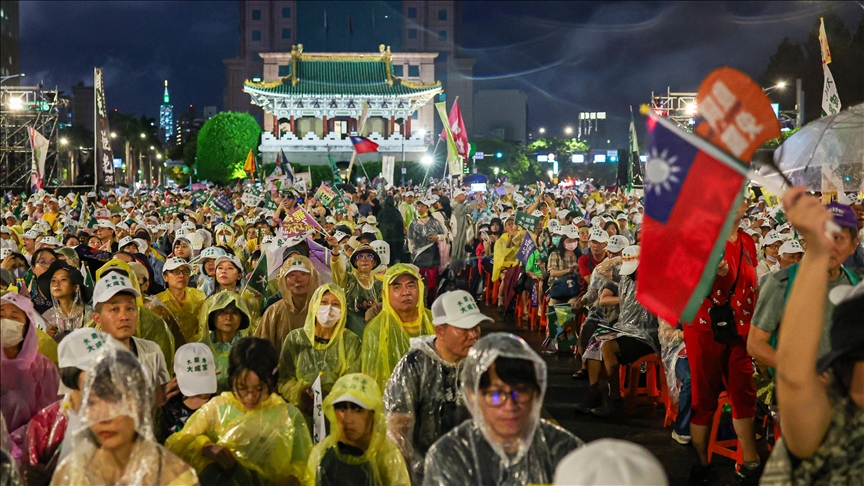Taiwan set to hold ‘recall vote’ amid ‘weak ruling party’
Fate of 24 opposition lawmakers to be decided on Saturday when people cast ballot in ‘recall vote’

- 2024 general election threw up a ‘weak ruling party and strong opposition landscape,’ says researcher Chien-Yu Shih
ISTANBUL
Taiwan is set to hold a "recall vote" on Saturday to decide the fate of at least 24 lawmakers representing the opposition bloc, which dominates the Legislative Yuan, the regional legislature.
The recall vote targets 31 legislators of the main opposition Kuomintang (KMT) and the suspended mayor of Hsinchu City, who belongs to the Taiwan People’s Party (TPP).
Taiwan, home to around 24 million people, has seen increasing political polarization over the issue, dubbed "Great Recall."
On Saturday, during the first round of voting, the fate of 24 lawmakers and the mayor will be determined.
The second round of voting will be held on Aug. 23 to determine the recall results for the remaining 7 KMT legislators.
In the last elections held in January 2024, when William Lai Ching-te was elected as Taiwan’s leader, the KMT won 52 out of 113 seats. With the support of TPP and two independent legislators, the party leads a 62-seat majority coalition.
The electoral success of the opposition left Lai’s ruling Democratic Progressive Party "weak," according to experts.
The Lai administration has faced back-to-back setbacks in the legislature due to dominant opposition.
On Friday, the opposition-dominated legislature rejected all seven nominees of Lai for the Constitutional Court.
The recall vote has three stages, starting with a proposal to recall by voters in the electoral district of the legislator. But the number of proposers must be at least 1% of the total registered voters.
According to the law, in any electoral constituency, 25% of registered voters must participate, and the recall must receive more votes in favor than against.
Later, a petition is circulated among the public to collect signatures, which must be at least 10% of the total voters. If it receives the required numbers, the Election Commission conducts the recall vote.
The system was first introduced by Switzerland in the 19th century and later adopted by many US states.
If the voter recall is successful in dislodging KMT lawmakers, it will trigger a by-election within three months for these seats.
And in this case, the DPP would need to win at least six seats to regain control of the legislature.
‘Weak’ ruling party vs. strong opposition’ landscape
Chien-Yu Shih, associate research fellow at the Taipei-based Institute for National Defense and Security Research, told Anadolu the 2024 general election threw up a "weak ruling party and strong opposition" landscape.
"The two major opposition parties, the KMT and the TPP, have jointly introduced several bills that have sparked public outrage," he said.
Taiwan, which has emerged as a hotspot of geopolitical tensions between the US and China, has seen defense spending increase in recent years, but the opposition parties have taken steps to cut the budget, triggering a fierce reaction from Lai, the regional leader.
"Clashes between the ruling and opposition parties have escalated within the legislature, prompting civic groups to independently launch recall campaigns," said Chien-Yu.
Dominant opposition shows ‘desires for balance’
The recall vote comes 14 months after Lai was inaugurated into office.
Shun-wen Wang, a professor at National University of Kaohsiung, Taiwan, told Anadolu that the fact that the opposition holds a majority in the Legislative Yuan "indicates that the public still desires a balance of power."
"In terms of governance, the ruling party naturally faces obstruction from the opposition. Thus, it has adopted a strategy of large-scale recall efforts in an attempt to alter the future distribution of seats," Shun-wen said.
He believes the recall vote may "influence the positions of smaller parties," such as the TTP, "thereby fracturing the opposition alliance."
"For the ruling party, this is a calculated and potentially rewarding strategy."
Chien-Yu says: "The ‘mass recall’ is not merely a challenge to individual politicians but is seen as a concrete expression of voters holding the legislature accountable."
‘Campaign rhetoric secured minority government’
Lai’s first year in office "underscores significant vulnerabilities in Taiwan’s domestic governance and economic stability," Beijing-based Asia analyst Einar Tangen told Anadolu.
"His campaign rhetoric, centered on a strong stance against China, only secured a minority government," Einar recalled.
However, the analyst said Lai’s "initial provocations against the mainland have softened, as he deals with an unreliable US, economic turmoil, and falling polls, which reveal the inherent constraints of governing without broad legislative support."
"The gap between campaign promises and political reality has become increasingly apparent, weakening his position both domestically and internationally," he claimed.
However, Shun-wen from National University of Kaohsiung noted Lai’s one year in office "reflects the Taiwanese people’s dissatisfaction and unease toward China’s increasing pressure."
Anadolu Agency website contains only a portion of the news stories offered to subscribers in the AA News Broadcasting System (HAS), and in summarized form. Please contact us for subscription options.







